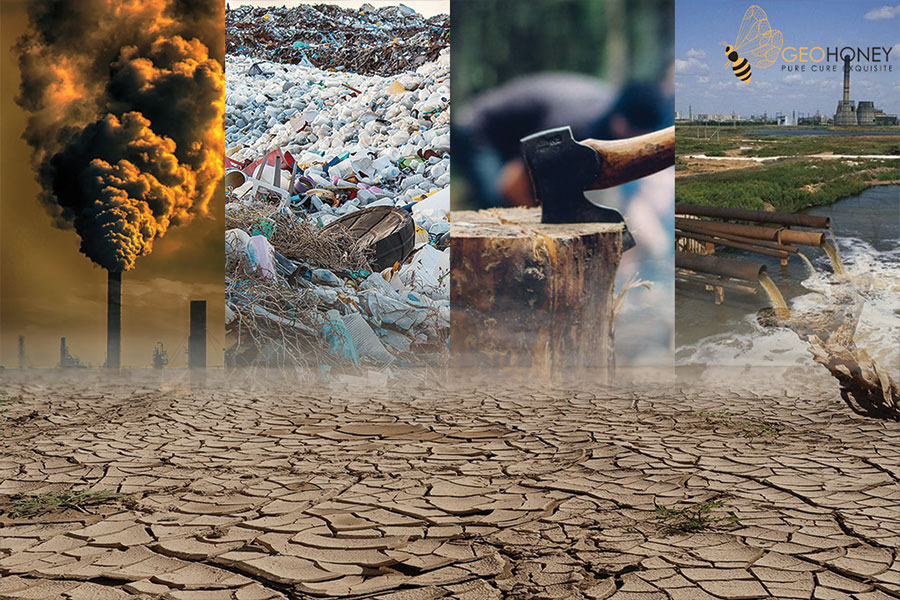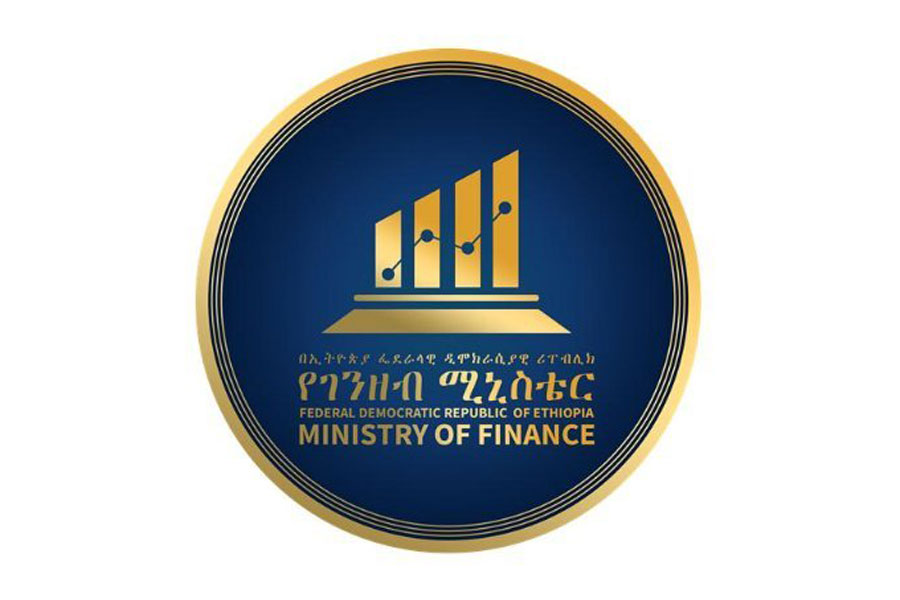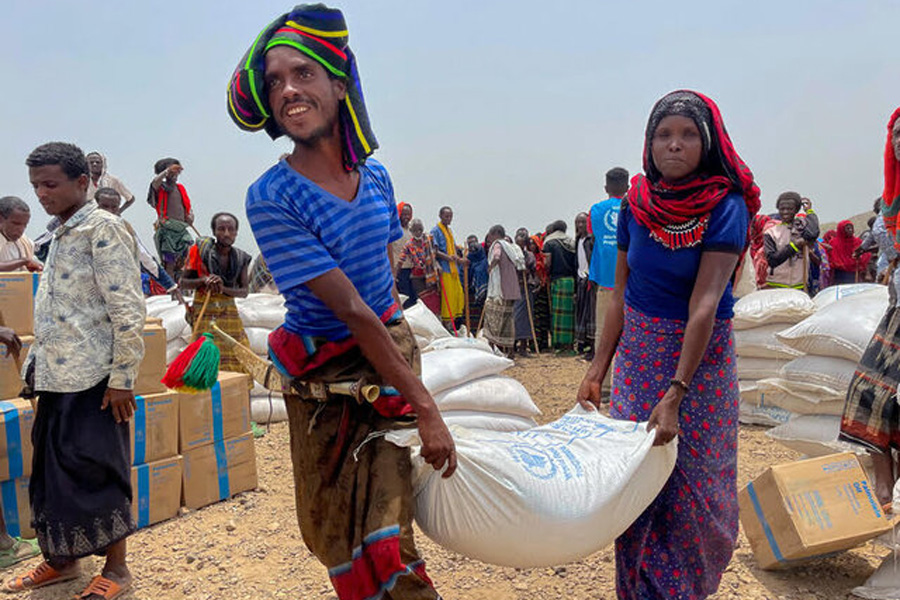
View From Arada | Aug 09,2025
The federal government is staking a growing share of its expanding budget on climate resilience, an act seen as a political will that may double as economic self-harm, a new cross-country analysis by Development Transformation (DevTransform) revealed. The federal government would earmark nearly 54 billion Br, 2.8pc of its 2025/26 budget, for climate action, a higher percentage than any other major social service aside from debt servicing.
The report shows that the government earmarked the equivalent of 182pc of its federal maternal and child health budget and more than twice the urban food security and safety net envelope for climate-related programs over the past three fiscal years. The analysis uncovered that the federal government's climate budget could have built half of the country's major roads or funded nearly 40pc of the university system. Experts warn that vital sectors, such as health and education, are already seeing their funding displaced. They fear that climate funds meant to prevent systemic collapse are accelerating underdevelopment in their own right.
In the Borena Zone of the Oromia regional State, a drought in 2021/22 killed 3.3 million livestock, displacing 65,000 families, causing a recovery cost of 33 billion Br.
“The land became empty,” Guyo Kenchora, an official from the local agriculture bureau, told Fortune.
The Southern and Somali regional states were hit as well. The federal government has since started to invest in mitigation. Billions of Birr have been spent on dam projects to secure water in the region. Guyo expect another major drought within the next five years, and preparations are already underway. Pastoralists are stockpiling feed for their animals and buying livestock insurance. The average premium for insuring three animals is 2,600 Br.
“Nobody had gotten anything in the past,” Guyo said.
Other countries in the study, including Cameroon, Eswatini, Ghana, Kenya, Malawi, Mali, Mauritania, Namibia, and Zambia, showed consistent climate spending ranging from 0.1pc to 2.8pc of national budgets. Mauritania matched Ethiopia’s top commitment, while Kenya and Ghana also made notable allocations, despite spending 21 to 29 times more on debt service than on climate. In Mali, the difference is even more pronounced, with debt service outpacing climate spending by a factor of 75.
What makes Ethiopia’s case striking is the stability of its climate allocation between one and two percent of total public spending annually since 2022, despite a punishing macroeconomic environment marked by high inflation, currency depreciation, and rising debt service. For every dollar spent on climate adaptation, 10 dollars are swallowed by debt payments, according to the study by DevTransform, a Nairobi-based not-for-profit organisation.
“This is a zero-sum game,” said Martha Getachew, a co-founder and director of the research group behind the study.
She likened the situation to “paying a loan with interest to a person who burnt your house for renovation.”
DevTransform stated that the consistency demonstrates a political commitment to climate adaptation that contradicts the notion that African states are waiting passively for external donors to lead the charge. The researchers say Ethiopian leaders' policy commitment is a part of a broader pattern across Africa, where poor countries pay in hard currency to address a crisis they did not cause.
At a recent Africa Climate Summit held in Addis Abeba, the continent’s leaders reframed Africa not as a victim but as a solution-bearer. They have launched the Africa Climate Innovation Compact, designed to mobilise 50 billion dollars annually by 2030. But much of this funding remains contingent on scarce grants and concessional finance, often tangled in the same debt webs that climate spending seeks to loosen.
African heads of state, including William Ruto (PhD) of Kenya, called for reforms to global development banks, lower borrowing costs, and a greater African voice in global finance. Denmark pledged 79 million dollars for agricultural transformation, and Italy reaffirmed its 4.2 billion dollars, with 70pc going to Africa.
The Summit also featured technical agreements between the European Investment Bank and domestic banks such as Global and Zemen, Dashen, and Hibret to support 100 million dollars in green investments by 2027. This effort, part of the Mission 300 Agenda and Clean Cooking Initiative, plans to deliver clean energy to 300 million people and clean cooking solutions to 900 million Africans in the coming years.
New strategies were also announced for using Africa’s vast mineral resources, such as cobalt, lithium, copper, and rare earths, for local processing and job creation, moving the continent beyond its traditional role as a supplier to global value chains. Financial tools are being developed to mitigate climate-fueled health risks, ranging from heatwaves to infectious disease outbreaks. The Addis Abeba summit launched the Africa Just Resilience Framework and the Climate Justice Impact Fund, which has already supported 64 projects across 17 countries.
With the African Union (AU) and Ethiopian leaders pledging to lead the implementation of these commitments, the Summit called for a unified effort for stronger multilateralism and fairer financial arrangements at COP30, to be held in Brazil.
Ethiopia, among the world’s most climate-vulnerable countries, was praised for its ambition but penalised for its means. Its leaders argue that without a shift from loans to grants and without structural reforms in global financial governance, the burden will continue to shift downward, onto countries least able to bear it.
This wass not lost on Seyum Mekonen, state minister for Planning & Economic Development.
“The price is paid by those who didn’t cause the problem,” he said.
For Martha, it is the wealthy countries that are the primary cause of climate change, but the poor countries that are being forced to pay for its mitigation and recovery.
The State Minister pressed that developed countries ought to be covering up to 80pc of climate finance, but for Ethiopia, “the finance is only 0.4pc of the climate finance.”
Africa’s leaders have long insisted that their countries are not to blame for the climate problems they now face. Instead, much of the responsibility, they argue, lies with wealthy, industrialised countries. The data is hard to dispute. The World Population Review reported in 2023 that a handful of major economies dominate global carbon dioxide emissions.
China remains the largest emitter, producing roughly 13.26 gigatons of carbon, or about 35pc of the global total. The United States follows with 4.68 gigatons, representing approximately 12pc. India emits 2.95 gigatons (seven percent) while the European Union’s (EU) 27 countries together contribute 2.8 gigatons, another seven percent. Altogether, the top five polluters produce more than 60pc of global emissions, uncovering the disproportionate share that the world’s largest economies have in the crisis.
According to the International Energy Agency (IEA), Africa’s total emissions from fossil fuels in 2022 were about 1.4 billion metric tons, 3.9pc of the world’s total. In the same year, Asia produced over 19 billion metric tons. The United Nations reported that the continent is warming at a rate higher than the global average, and that climate change is costing African countries roughly five percent of their GDP each year. In 2021, the average African produced 1.04tns of carbon, well below the global average.
The report by DevTransform echoed this wider paradox, where a continent contributes less than four percent of global emissions. Yet, countries are spending more of their budgets on climate change mitigation than most high-emitting countries. The fiscal toll is exacerbated by weakening currencies and rising debt burdens. Malawi, Zambia, Kenya, and Ethiopia all saw their dollar-value climate budgets shrink despite nominal increases in local currency allocations.
Despite the growth in domestic notes from an allocation of 786.6 million Br in 2022/23 to 971.2 million Br in 2024/25, the dollar-denominated value shrank from 15.1 million to 11.6 million dollars during the same period.
Experts such as Mekonnen Maschal Tarekegn, a professor at Ethiopian Civil Service University, believe more fundamental change is needed. Communitirecogniseught-prone regions often end up planting crops for their animals and lining up for food aid at the same time.
“Even though the major solution has been diversifying incomes by making pastoralists start agriculture, implementation is not being seen,” he said. “Ethiopia is one of the highest risks of climate change vulnerability.”
Mekonnen argued that the country should adopt more robust mechanisms for loss and damage reimbursement and broader climate insurance coverage. He urged that current approaches to reducing emissions, and selling carbon credits for the remainder, need to be re-examined. The government has pledged to cut emissions by 68.8pc, but the actual impact of mitigation efforts is still unclear.
The DevTransform report called on international partners to recognise the efforts African countries are making and to shift toward grant-based climate finance.
“Debt, not lack of political will, is the real constraint,” the authors wrote, urging global actors to support African climate leadership without exacerbating fiscal strain.
PUBLISHED ON
Sep 21,2025 [ VOL
26 , NO
1325]

View From Arada | Aug 09,2025

Fortune News | Dec 23,2023

Fortune News | Mar 23,2024

Fortune News | Jun 20,2020

My Opinion | Aug 16,2020

View From Arada | Jul 19,2025

Fortune News | Mar 04,2023

My Opinion | Aug 25,2024

Fortune News | Dec 01,2024

Fortune News | Feb 04,2023

Dec 22 , 2024 . By TIZITA SHEWAFERAW
Charged with transforming colossal state-owned enterprises into modern and competitiv...

Aug 18 , 2024 . By AKSAH ITALO
Although predictable Yonas Zerihun's job in the ride-hailing service is not immune to...

Jul 28 , 2024 . By TIZITA SHEWAFERAW
Unhabitual, perhaps too many, Samuel Gebreyohannes, 38, used to occasionally enjoy a couple of beers at breakfast. However, he recently swit...

Jul 13 , 2024 . By AKSAH ITALO
Investors who rely on tractors, trucks, and field vehicles for commuting, transporting commodities, and f...

Oct 25 , 2025
The regulatory machinery is on overdrive. In only two years, no fewer than 35 new pro...

Oct 18 , 2025
The political establishment, notably the ruling party and its top brass, has become p...

Oct 11 , 2025
Ladislas Farago, a roving Associated Press (AP) correspondent, arrived in Ethiopia in...

Oct 4 , 2025
Eyob Tekalegn (PhD) had been in the Governor's chair for only weeks when, on Septembe...